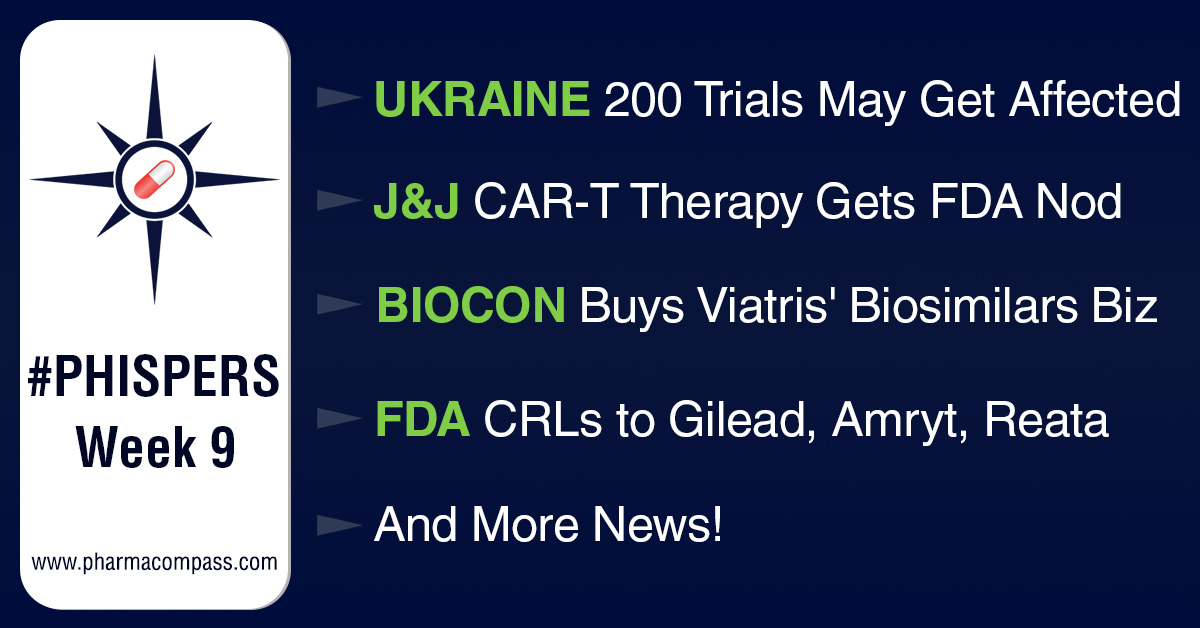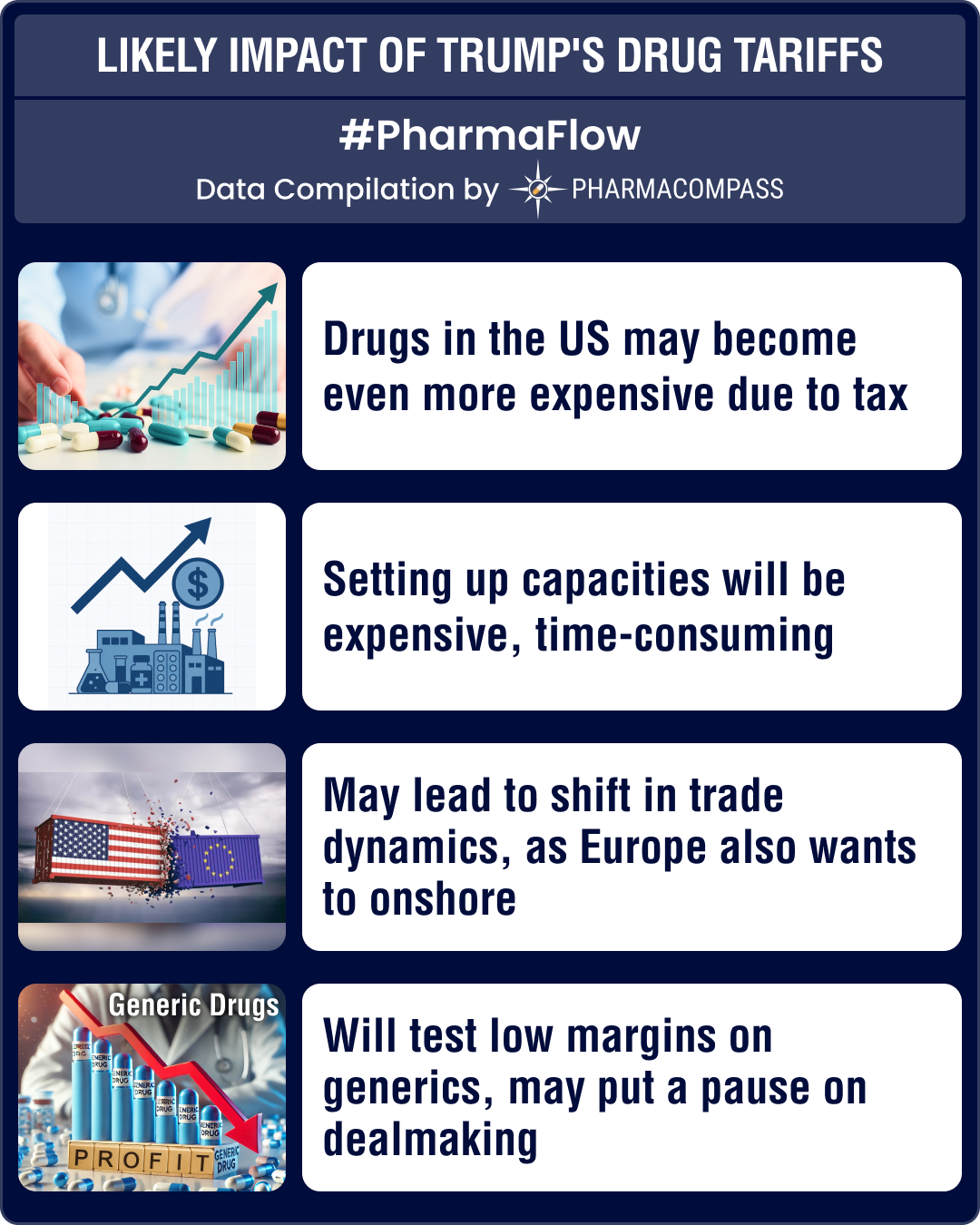
By PharmaCompass
2022-03-03
Impressions: 1,591
Over the last one week, the world has been shaken by Russia’s invasion of Ukraine. While governments, organizations and companies have condemned the violence and have expressed concerns over the safety of their people, for the pharma industry the war could delay over 200 clinical trials underway in Ukraine.
In regulatory news, the FDA approved a CAR-T therapy developed by J&J and its Chinese partner Legend Biotech to treat a type of blood cancer. The agency also designated Pfizer’s experimental vaccine to prevent respiratory syncytial virus (RSV) a breakthrough therapy status. The status could help Pfizer emerge as the first drugmaker to launch a vaccine to prevent this respiratory illness that can be life-threatening for infants.
This week’s Phispers also brings you news that a federal bankruptcy court judge has ruled in favor of J&J’s strategy to resolve its talc lawsuits, saying it will offer a faster and fairer settlement. Earlier, prosecutors had argued that J&J’s move was an abuse of the US Bankruptcy Code.
In M&A news, Indian drugmaker Biocon Biologics acquired US-based Viatris’ biosimilars business for US$ 3.34 billion. And AbbVie beefed up its neuro pipeline by acquiring Belgium-based Syndesi Therapeutics in a deal valued at up to US$ 1 billion.
Sanofi and Regeneron’s blockbuster drug Dupixent (dupilumab) notched up a crucial win in a phase 3 study of patients with eosinophilic esophagitis (EoE), prompting the French drugmaker to seek an additional nod for the blockbuster drug from the FDA. Celyad Oncology paused the trial of its CAR-T cell therapy — CYAD-101 — following the deaths of two patients who had received the treatment.
Meanwhile, the FDA rejected Gilead Sciences’ injectable HIV drug lenacapavir over concerns that the vials meant for the drug could react to form sub-visible glass particles in the solution. The agency also issued CRLs to Reata Pharmaceuticals’ kidney disease drug and Amryt Pharma’s rare skin disease drug candidate.
Russian invasion of Ukraine may affect over 200 clinical trials
Russia’s invasion of Ukraine is likely to affect millions of people around the globe, as the war will delay several ongoing clinical trials by major pharma companies.
According to the US Food and Drug Administration’s clinical trials database, 251 clinical trials for drugs and devices are underway in Ukraine. Merck has 11 Ukrainian sites conducting a phase 3 trial of Keytruda when used in combination with Lenvima in patients with endometrial carcinoma, a type of cancer that begins in the uterus. And there are six locations in Ukraine that are holding phase 3 trial of Regeneron’s cancer drug — Libtayo — when used in combination with doublet chemotherapy in patients with non-small cell lung cancer.
GlaxoSmithKline has 27 Ukrainian sites in itsphase 3 study of otilimab in patients with rheumatoid arthritis. Sanofi has at least two studies underway in Ukraine for the Regeneron-partnered med Dupixent, while AstraZeneca has up to 20 active trial cites in Ukraine. Drugmaker Karuna Therapeutics said the timelines for a late-stage trial for schizophrenia may be affected badly as 10 of the 19 trial sites are in Ukraine.
Meanwhile, trials in Russia may also get affected as the country faces economic sanctions. Biogen has several trial sites in Russia for three ongoing phase 3 trials. Incyte has study sites in both Ukraine and Russia for two programs. And Eli Lilly, which is conducting studies with Incyte for co-developed JAK inhibitor baricitinib in inflammatory diseases, has several sites in Russia.
J&J-Legend’s CAR-T therapy for blood cancer bags FDA nod; to take on BMS’ Abecma
This week, the US Food and Drug Administration (FDA) approved a therapy developed by Johnson & Johnson and its Chinese partner Legend Biotech to treat a type of white blood cell cancer.
The drug, to be sold as Carvykti in the US, is the latest CAR-T therapy to win FDA approval. CAR-T drugs harvest a patient’s disease-fighting T-cells, genetically engineering them to target specific proteins in cancer cells and replacing them to seek out and attack cancer.
The drug is also the second approved treatment for multiple myeloma — a cancer that forms in a type of white blood cell. Almost all patients treated with Carvykti responded well to the therapy in a study and no cancerous cells were found in the blood or bone marrow of 83 percent patients after a median follow-up of two years.
The therapy, priced at US$ 465,000, is up against Bristol Myers Squibb and 2Seventy bio’s rival CAR-T drug Abecma, which was approved by the FDA a year ago. J&J and Legend have pegged the drug’s peak sales at above US$ 5 billion. Carvykti is also being reviewed by health authorities in Japan and Europe.
Court favors J&J’s bankruptcy strategy to settle talc lawsuits: Johnson & Johnson’s strategy to establish a holding company for talc lawsuits and then declare it bankrupt to save billions in compensations has found favor with the courts.
Freezing all outstanding talc cases against J&J, Judge Michael Kaplan of the federal bankruptcy court in Trenton, New Jersey, said the drugmaker can usethe bankruptcy system to find a settlement. A settlement will free the pharma giant from over 38,000 lawsuits that claim its talc products contained asbestos and caused ovarian cancer and mesothelioma, a cancer linked to asbestos exposure. J&J disputes the claims.
J&J called the ruling a positive development. The company has already paid US$ 4.5 billion to resolve talc claims over the last five years.
In October, J&J had used the Texas two-step tactic to put all talc lawsuits into a newly created entity — LTL Management LLC — which filed for bankruptcy soon after. The tactic allows companies to separate their assets from their liabilities and add them to a newly established firm. At that time, prosecutors had argued that J&J’s move was an abuse of the US Bankruptcy Code. The judge, however, said J&J’s approach offers a faster and fairer alternative to decades of litigation in other courts.
Opioid settlement: J&J and three US drug distributors — AmerisourceBergen, Cardinal Health and McKesson — have agreed to finalize a US$ 26 billion settlement to resolve around 3,000 lawsuits that claim they helped fuel the US opioid crisis. Of the 49 eligible states, 46 have agreed to join the settlement. J&J will pay US$ 5 billion over nine years, while the distributors will pay US$ 21 billion over 18 years. J&J has settled with New York, Texas, Nevada and New Mexico. If approved by the courts in each state, the firms will start making payments to the governments in April.
After late-stage trial win, Sanofi seeks FDA add-on nod for blockbuster Dupixent
Sanofi and Regeneron’s blockbuster drug Dupixent (dupilumab), which generated around US$ 6 billion (€5.25 billion) in sales last year, has notched up a crucial win in a phase 3 study of patients with eosinophilic esophagitis (EoE) — an inflammatory disease that damages the esophagus and makes it hard for patients to swallow food or sip water.
A 300 mg dose of the weekly Dupixent “significantly” improved the condition of 64 percent of the patients over those assigned a placebo by week 24, Sanofi said, adding it will roll out detailed results on a two-week dosing regimen soon.
The drugmaker has submitted the data to the FDA to snag a fourth indication for the drug. It also plans to file for approval in other countries later this year. Dupixent had scored an FDA breakthrough therapy tag for this indication in 2020. The company aims to generate US$ 11 billion (€10 billion) or more in peak sales from the drug.
Pfizer’s RSV vaccine candidate bags breakthrough therapy status
Pfizer on Wednesday inched closer to creating the first vaccine to prevent respiratory syncytial virus (RSV), a common respiratory illness that can be potentially life-threatening for infants.
The US drugmaker said the FDA has designated its experimental RSV vaccine, RSVpreF, as a breakthrough therapy — a status that speeds up the review process of new and promising drugs or vaccines. Pfizer’s success came days after Moderna began a late-stage study of its RSV shot and GSK paused a late-stage trial for its vaccine candidatedue to a safety concern.
FDA’s breakthrough designation is based on the results of a trial that tested the safety and immunogenicity of the vaccine in healthy pregnant women who were vaccinated between 28 and 36 weeks of gestation. Pfizer will publish the outcomes of the study at a future date.
Biocon Biologics buys partner Viatris’ biosimilars business for US$ 3.34 billion
Indian drugmaker Biocon on Monday said its subsidiary Biocon Biologics is acquiring US-based Viatris’ biosimilars business for US$ 3.34 billion.
Viatris will get up to US$ 2.34 billion in cash and shares worth US$ 1 billion in Biocon Biologics.The Indian drugmaker will shell out up to US$ 335 million as additional payments.
The deal will expand Biocon’s biosimilars portfolio of 20 treatments — including 11 that are with Viatris — by adding therapies for treating diabetes, tumors and autoimmune diseases. Biocon Biologics and Viatris already have an extensive collaboration agreement under which they develop, manufacture and commercialize several biosimilars and diabetes generic drugs, including insulin injection Semglee.
The Viatris biosimilar portfolio is expected to generate US$ 875 million revenues in 2022, and the number could surpass US$ 1 billion next year, Biocon said. The transaction is expected to close in the second half of 2022.
AbbVie buys Syndesi Therapeutics for US$ 1 billion: AbbVie has beefed up its neuro pipeline by acquiring Belgium-based Syndesi Therapeutics in a deal valued at up to US$ 1 billion.
The pharma giant will pay Syndesi US$ 130 million in cash and another US$ 870 million in milestones for rights to novel modulators of the synaptic vesicle protein 2A (SV2A), including its lead molecule SDI-118. The drug targets the communication between neurons in the brain that become dysfunctional with the advance of degenerative ailments such as Alzheimer’s disease.
Sanofi ties up with Adagene: Sanofi has announced a tie-up with bispecific antibody producer Adagene for up to four antibody candidates in oncology. Under the terms of the deal, Sanofi will be able to apply Adagene’s technology to two of its antibody candidates, with the option to add two more candidates later. While Adagene will be responsible for early-stage research, Sanofi will take up later stage research and all clinical, product development and commercialization activities. Sanofi has agreed to pay US$ 17.5 million upfront and has promised up to US$ 2.5 billion in potential milestone payments and royalties.
FDA puts clinical hold on Celyad’s CAR-T trial; hands CRLs to Amryt, Gilead, Reata
Ireland-based Amryt Pharma received a major blow on Monday when the FDA refused to approve its drug candidate Oleogel-S10 for a rare skin disease — epidermolysis bullosa (EB). The biotech said the agency has handed it a complete response letter (CRL), asking it to furnish “additional confirmatory evidence of effectiveness for Oleogel-S10 in EB”. EB is a rare, genetic skin disease characterized by extremely fragile skin that blisters and tears from minor friction or trauma. There are no FDA-approved treatment options for the disease.
Clinical hold on Celyad’s CAR-T combo drug trial: Two patients died after receiving Celyad Oncology’s CAR-T cell therapy — CYAD-101 — prompting the Belgium-headquartered biotech to voluntarily pause the phase 1b trial. Both the colorectal cancer patients had similar pulmonary findings, the company said.
According to Endpoints News, the FDA swiftly acted on the matter and has now put the trial on clinical hold “due to insufficient information to assess risk to study subjects.”
The trial is part of a 2020 collaboration between Celyad and Merck. The biotech is studying CYAD-101 administered with chemotherapy, followed by Merck’s Keytruda cancer drug, in patients with refractory metastatic colorectal cancer. Celyad said it is investigating the deaths and “evaluating any similar events in additional patients treated on study.
Rejects Gilead’s HIV drug over glass vial concerns: The FDA on Tuesday rejected Gilead Sciences’ injectable HIV drug over concerns related to the vials. In its complete response letter (CRL), the FDA cited the compatibility issue of lenacapavir with vials made of borosilicate glass that could lead to the formation of sub-visible glass particles in the solution.
Gilead’s submission to the FDA was based on data from a phase 2/3 trial, which evaluated the safety and efficacy of lenacapavir administered subcutaneously every six months in combination with an antiretroviral. It is meant for treating patients who have undergone prior therapy and are resistant to multiple existing drugs. The agency did not request any new clinical trials in its CRL.
Reata’s kidney disease drug denied FDA nod: The FDA has rejected Reata Pharmaceuticals’ drug to treat chronic kidney disease. In its CRL, the agency said the data provided by the company for the drug bardoxolone does not prove its effectiveness in patients with Alport syndrome (a genetic disease that impacts the body’s ability to create collagen proteins, necessary for filtration in the kidneys). The drugmaker said the FDA has asked it to identify and produce more convincing data on the drug’s ability to lessen the loss of kidney function.
The PharmaCompass Newsletter – Sign Up, Stay Ahead
Feedback, help us to improve. Click here
Image Credit : Phisper Infographic by SCORR MARKETING & PharmaCompass is licensed under CC BY 2.0
“ The article is based on the information available in public and which the author believes to be true. The author is not disseminating any information, which the author believes or knows, is confidential or in conflict with the privacy of any person. The views expressed or information supplied through this article is mere opinion and observation of the author. The author does not intend to defame, insult or, cause loss or damage to anyone, in any manner, through this article.”








